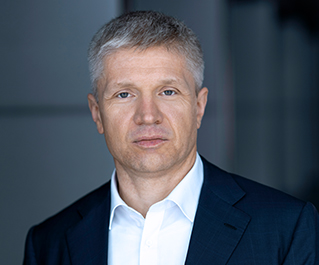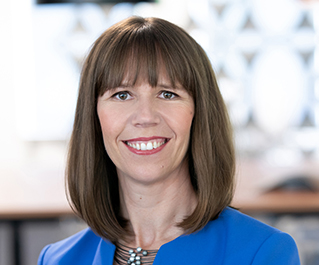Interview with Günther Thallinger and Renate Wagner
Sustainability will be treated like finance and we need all our employees to work on it
Günther Thallinger: No. And that is good news. Allianz was founded 134 years ago on the premise of sustainability - managing risks for customers, employees, communities and society to enable their resilience and growth. Given the many challenges that societies face today, this remains an important mission.
We have a clear sustainability strategy where we are addressing climate change with our Inaugural Transition Plan, and working on our social impact through MoveNow, to positively influence not only the present but also the future living conditions in the communities in which we operate. With the strategy we are now focusing all our capacity on the implementation and therefore the impact of our sustainability approach; i.e. we no longer need to work on the details of the strategy as in previous years. From now on, the organization will increasingly integrate our sustainability ambition into its decision-making.
Renate Wagner: And it is fully connected to our purpose - "We secure your future" - which informs all our decisions every day and shapes our approach to sustainability. The very nature of what we do - pooling, investing and managing risk to protect and grow lives, assets and businesses for our 125 million private and corporate customers - contributes to creating more secure and sustainable societies and economies.
Günther Thallinger: Sustainability is being treated like finance, and we're starting with our 2023 annual report, where we have enhanced the Non-Financial Statement (NFS), which covers the most relevant sustainability matters for our business, including environmental, employee, community, human rights and governance aspects. In this reporting cycle we have started to partially implement the Corporate Sustainability Directive (CSRD) logic into the Annual Report with reporting on policies, actions and targets, supplemented by an easier to read short version summarizing our most relevant sustainability matters.
Renate Wagner: The enhancement of the annual report not only fulfills the CSRD requirements - which will provide more clarity and comparability on how companies are committed to sustainability action - but it also reinforces the message that sustainability is a core aspect of our business and is important to our employees in many ways. It affects how they make day-to-day business decisions, how they support the implementation of our sustainability targets, and how they help to change the way they do business. This is why we offer Group-wide training on sustainability, as we need a high level of sustainability literacy to be prepared for the implementation of our sustainability targets. I’m proud to say that our Group’s Sustainability Journey is designed for every employee to provide a learning journey on this important topic. Starting with the Sustainability Basic Training, employees receive a foundational understanding of sustainability in general. The training is currently active in 40 Operating Entities and available in nine languages, with thousands of employees already completing it.
Günther Thallinger: Allianz is a risk manager, and that brings us immediately to the issue of climate change, which is a major threat to societies and natural ecosystems and an existential business risk for us. The consequences of climate change for individuals and businesses are profound. For individuals, it puts their health, income and assets at risk. For companies, it disrupts physical assets and business continuity, raises the question of adequate and affordable insurance coverage, and touches the very foundation of our business model.
Renate Wagner: And that’s exactly why we are committed to meaningful change and doing something about it! In 2023, we published our first comprehensive net-zero transition plan, and we have detailed our long-term strategic climate commitment to achieve net-zero emissions by 2050, covering several business areas. For example, we outline intermediate targets by 2030 to reduce greenhouse gas emissions in the investment of policyholder funds, the P&C insurance business, and Allianz's own operations. These are significant commitments and delivering on our plans and promises will help build trust in our company, but we know we need the support of our people in working towards these. That is why in 2024 - like last year - the achievement of certain sustainability targets will determine whether we offer our employees a Free Share in 2025. Through the award of the Allianz Free Share, we are able to foster a sense of ownership amongst our people and I am incredibly proud that 70% of our people now own shares in our company.
Günther Thallinger: This is linked to sustainability goals in so many aspects, not only through the underlying target systematic. If employees participate in the Free Share offer, they have a different perspective as owners of our company. As owners we believe they also share a long-term perspective on our business and activities. That is why we launched last year the Employee Investor Day, where we have a global exchange on strategic issues, including sustainability.
Renate Wagner: We know from our most recent Allianz Engagement Survey that an overwhelming majority of Allianz employees believe it is important for the company to be committed to sustainability, with 88% of our people feeling strongly about this. They want to be part of an organization that makes our world a better place. This means not just talking about it but acting on it too. Ultimately, it is our employees who drive change, for example in our approach to underwriting and our proprietary investments and basic decisions like travel. Lifelong learning also plays a key role in ensuring our future sustainability as an employer. The skills needed for jobs are expected to change at least 65% by 20301 and because of these changes, continuous development and upskilling are essential to stay successful. That’s why we must foster a culture of continuous learning and development throughout our organization. It’s crucial if our business and people want to stay relevant and competitive, and I am incredibly proud that last year our employees learned on average 50 hours.
Günther Thallinger: Ultimately, our strategy comes to life in the operating units. Each unit brings its own ingenuity, tailored to its needs and culture. Some operating entities (OEs) are already well advanced in embedding sustainability into their products and in pursuing sustainable growth. All OEs should follow their lead. With our strategy, we can now start to provide sustainability services to all our customers.
Günther Thallinger: We will continue to work on implementing the transition plan. We will strengthen our existing engagement activities with clients and investee companies on a shared journey to a net-zero transition. In both our investment and insurance businesses, we will expand our targeted growth in renewable energy, low-carbon and transition technologies, and sustainable mobility.
Renate Wagner: I would love to see more employees being part of the sustainability learning journey and improving their literacy in this area. I also hope to see more of our people become owners of our business. As Günther said in our last Employee Investor Day – the Free Share is free! Our employee shareholders are now personally benefiting from Allianz delivering on its strategy, which is fantastic. Our people are also our strongest asset and I remain convinced that our 157,000 colleagues across the world will help us by playing our part in ensuring we have a planet worth living on.

Günther Thallinger

Renate Wagner
Related links
About Allianz
** As of December 31, 2023.



